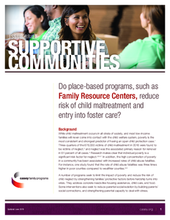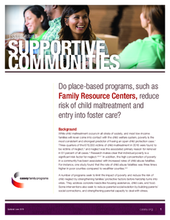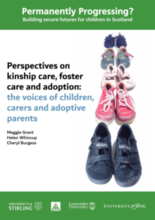Displaying 5951 - 5960 of 14348
L’objectif de la consultation est d’appuyer le Ministère de la Population, de la Protection Sociale et de la Promotion de la Femme (MPPSPF) pour la finalisation du Projet de décret réglementant le dispositif des familles d’accueil et l’élaboration de son exposé de motif.
This issue brief addresses the following questions: What are family resource centers? What are the defining characteristics of a family resource center? What do we know about the effectiveness of family resource centers in reducing child welfare involvement? What is the return on investment? What is missing from the research literature?
This issue brief describes family resource centers, their defining characteristics, and what is known about their effectiveness in reducing child welfare involvement. The brief also discusses return on investment and what is missing from the research literature.
The Decision making for children report is one strand of the Permanently Progressing? study. In this strand, during 2015-17, 160 decision makers were interviewed across Scotland mainly in groups, but some individually.
The aim of this particular strand of the Permanently Progressing? study was to investigate the experiences, pathways, and outcomes of children who became looked after away from home, together with the factors associated with achieving permanence.
This report on the linkage of Children Looked After Statistics (CLAS) with data from Scottish Children’s Reporter Administration (SCRA) is one strand of the Permanently Progressing? study. The study is the first in Scotland to investigate decision making, permanence, progress, outcomes and belonging for children who became ‘looked after’ at home, or away from home (with kinship carers, foster carers or prospective adopters) when they were aged five and under.
This report presents the findings from strand one of the Permanently Progressing? study, Pathways to Permanence for children who become looked after in Scotland. This strand analysed data from the Children Looked After Statistics (CLAS) provided to the Scottish Government by all 32 local authorities on the total cohort of children who became looked after during the year 1 August 2012 - 31 July 2013 when they were aged five and under
This report has been completed as one part of the study Permanently Progressing? Building secure futures for children in Scotland which heard directly from children about their experiences.
After almost five years of detailed research and analysis, the reports of the Permanently Progressing study (phase one) were published on 20 June 2019. The study investigated decision making, permanence, progress, outcomes and belonging for a large cohort (1,836 children) of all children in Scotland who became looked after in 2012-13, when they were aged five or under.
The U.S. State Department Trafficking in Persons Report sheds light on the practices of modern slavery around the world and highlights specific steps governments can take to protect victims of human trafficking, prevent trafficking crimes, and prosecute traffickers in the United States and around the world. The report includes several references to the links between orphanages and trafficking in relation to Nepal, Nigeria, Cambodia, Haiti, Sri Lanka, Moldova, and other countries.








